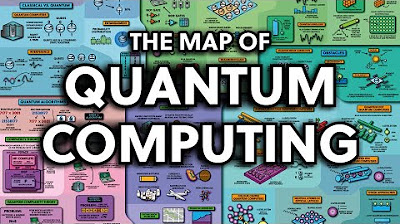Minecraft, But On a Quantum Computer
Summary
TLDRIn this video, the creator explores the possibilities of quantum computing in generating truly unique, complex, and explorable worlds for games. Sponsored by Kiskit, a quantum computing tool by IBM, the creator dives into the basics of quantum mechanics and the challenges of programming quantum algorithms. Using the Wave Function Collapse algorithm, they generate a seamless map, showcasing how quantum mechanics can revolutionize procedural world generation. Despite technical challenges and long generation times, the creator remains hopeful that quantum computing will one day make real-time, complex world generation a reality.
Takeaways
- 😀 Quantum computers are essential for generating truly unique, fully explorable worlds at lightning speeds, a challenge current systems can't fully tackle.
- 😀 Kiskit, an open-source tool by IBM's quantum team, allows even non-experts to write quantum algorithms and run them on real quantum computers.
- 😀 Quantum computing is still in its early stages, making quantum algorithm creation complex and challenging, but tools like Kiskit offer accessible resources.
- 😀 Procedurally generated games often reuse pre-made assets, resulting in repetitive patterns, which the author aims to improve with quantum computing.
- 😀 The Wave Function Collapse (WFC) algorithm is a powerful method for procedural generation, treating the entire map as a single quantum object for better cohesion and complexity.
- 😀 Superposition in quantum mechanics allows for multiple possibilities to exist simultaneously, which is used in the WFC algorithm to generate diverse maps.
- 😀 WFC eliminates impossible states in a map as it progresses, ensuring all positions on the map have one valid state, which makes the generated world seamless.
- 😀 The power of machine learning in quantum computing allows algorithms to learn from datasets and generate new types of content, such as houses built on hilly terrain.
- 😀 The process of generating complex maps using quantum algorithms can take hours on traditional computers, but quantum computing could drastically reduce this time.
- 😀 Despite spending weeks learning quantum mechanics and programming quantum algorithms, the author was unable to fully implement a quantum version of the algorithm, but remains hopeful about its potential.
- 😀 The potential applications of quantum computing extend beyond gaming, including in fields like cyber security, drug development, and more, with major breakthroughs expected in the future.
Q & A
What is the main problem with procedural generation in current games?
-The main problem with procedural generation in current games is that it often results in repetitive patterns and predictable outcomes. Even though the world is being generated procedurally, players may end up seeing the same structures or environments repeatedly.
Why does the author believe quantum computers are crucial for creating truly unique game worlds?
-The author believes that quantum computers can generate complex, one-of-a-kind worlds at lightning speeds, something that current classical computers struggle with. Quantum computers have the potential to handle the vast complexity of creating unique worlds in real-time.
What is Kiskit, and how does it relate to quantum computing?
-Kiskit is a quantum computing tool developed by IBM, which allows developers to write quantum computing algorithms in Python and run them on real-life quantum computers. It provides a platform for experimenting with quantum algorithms, even for developers without advanced expertise in the field.
What challenge does the author mention when working with quantum algorithms?
-The author mentions that writing quantum algorithms is tricky because quantum computing is still a relatively new field. Even though Kiskit offers a user-friendly interface, the complexity of quantum mechanics makes it difficult to create effective quantum algorithms.
What does the author mean by 'superposition' in quantum mechanics?
-In quantum mechanics, superposition refers to a state in which an object can exist in multiple possible states simultaneously. In the context of the world generation algorithm, the map is initially in superposition, meaning it exists as all possible maps at once until it is 'collapsed' into a final state.
What is the Wave Function Collapse algorithm, and how does it work in the context of world generation?
-The Wave Function Collapse (WFC) algorithm is a machine learning-based algorithm that can generate maps by learning from a dataset of possible states. It works by collapsing the superposition of states based on predefined rules, eliminating impossible configurations until only valid ones remain, producing a seamless, coherent world.
How does the WFC algorithm help in generating diverse structures within a game world?
-The WFC algorithm helps generate diverse structures by feeding it different datasets, such as houses built on flat land or houses built into hills. By changing the dataset, the algorithm can learn new types of structures and generate unique environments without human intervention.
What are the challenges faced by the author when implementing the WFC algorithm in the video?
-The author faced significant challenges, including the time-consuming process of setting up the data sets and the limitations of the map editor. Additionally, the algorithm itself took a long time to generate complex worlds, which was a key challenge in achieving the desired speed for generation.
Why does the author believe quantum computers will significantly improve world generation speed?
-Quantum computers can potentially reduce the time needed to generate complex worlds from hours to minutes or even seconds. The massive parallelization and speed advantages offered by quantum computing could allow for real-time generation of large, intricate game worlds.
What was the author's reaction to the performance of classical computers when generating worlds?
-The author was frustrated by the long wait times for generating complex worlds on classical computers. Despite the impressive results, the process of generating entire towns took hours, which made it impractical for a smooth gaming experience.
Outlines

This section is available to paid users only. Please upgrade to access this part.
Upgrade NowMindmap

This section is available to paid users only. Please upgrade to access this part.
Upgrade NowKeywords

This section is available to paid users only. Please upgrade to access this part.
Upgrade NowHighlights

This section is available to paid users only. Please upgrade to access this part.
Upgrade NowTranscripts

This section is available to paid users only. Please upgrade to access this part.
Upgrade NowBrowse More Related Video

Your Guide to 100+ Qubits: Quantum Computing in Practice

🚀 KOMPUTER KUANTUM Menggegerkan DUNIA 🌍 Dengan Kecepatan Ekstrem ⚡

What is Quantum Computing and why should we care?

The Map of Quantum Computing - Quantum Computing Explained

Computação Quântica - Fundamentos e Aplicações - Aula 07

Les Ordinateurs Quantiques
5.0 / 5 (0 votes)